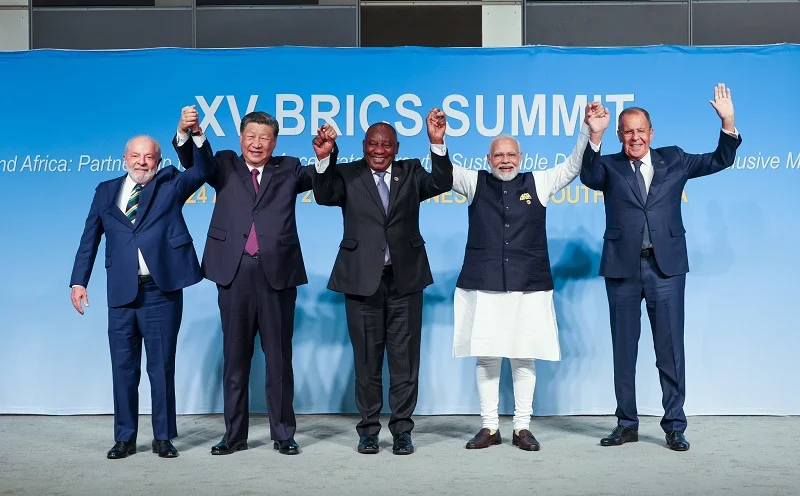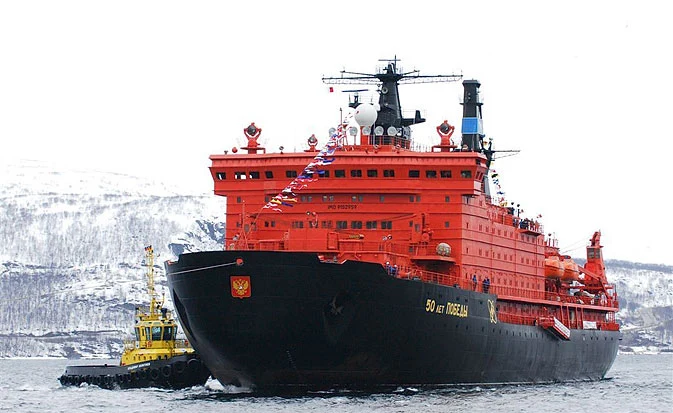

Prime Minister Narendra Modi with other BRICS leaders in Johannesburg, South Africa on Wednesday (Image courtesy: MEA)
Russia has endorsed India’s longstanding stance on improving the transport and logistics architecture of the region that would eventually help in unlocking the full potential of new centres of economic growth and global decision-making in Eurasia, the Middle East and Africa.
At the ongoing BRICS summit in Johannesburg, Moscow emphasised that the strengthening of interconnectedness and the creation of new sustainable transport routes has become “logical” and one of the top priorities of the five-member grouping that includes India, Russia, Brazil, China and South Africa.
Of particular importance in this context, said Russian President Vladimir Putin in his virtual address on Tuesday, is the initiative of the BRICS Business Council to develop modern intermodal logistics solutions and rail transport corridors.
He stated that Russia is actively reorienting transport and logistics flows towards reliable foreign partners, including those from the BRICS countries.


Spotlighting the flagship Northern Sea Route (NSR) and the International North-South Transport Corridor (INSTC) projects, he mentioned that these two, through arteries, are designed to provide the shortest and most cost-effective trade routes linking major industrial, agricultural and energy hubs with consumer markets.
“In turn, the North-South transport corridor will connect Russian ports on the northern seas and the Baltic Sea with sea terminals on the coast of the Persian Gulf and the Indian Ocean. This will create conditions for increasing freight traffic between Eurasian and African countries. In addition, new production facilities, trade and logistics facilities will naturally develop along this very corridor,” said Putin to the participants of the BRICS Business Forum, which is traditionally held before the leaders’ summit.
INSTC, the large-scale 7,200 km-long multimodal trade corridor, will start from Mumbai with nodes in West Asia, Central Asia, Caucasia and Russia, eventually linking the far-west Russian city of Saint Petersburg to the ports of Iran and India.
India has been pushing extensively for the utilization of New Delhi-backed Chabahar port in Iran, and its inclusion in the INSTC framework for improving the land-locked Central Asian region’s connectivity with the outside world.
As reported by IndiaNarrative.com, Russia has promised to eliminate infrastructural and legislative bottlenecks in INSTC that could become the main transport route of Eurasia in the coming decades.
India also believes that the Eastern Maritime Corridor (Chennai-Vladivostok Corridor) that would play a key role in expanding and diversifying the bilateral trade and economic cooperation.
“The Eastern Maritime Corridor, I think, fits in with our goal, what is called ‘Act East Policy’, as well as the Russian policy of having the Far East come in as an additional driver of the economy. So, I think there is a synergy there which is waiting to be tapped,” said External Affairs Minister S Jaishankar in March during the visit of Alexei Chekunkov, Russia’s Minister for the Development of the Far East and the Arctic, to New Delhi and Mumbai.
Moscow expects the Northern Sea Route to become a global transport corridor by 2035 that will connect the Asia-Pacific region with Europe and ensure efficient and safe transportation of goods.
“It is 40% shorter than the route through the Suez Canal and makes it eight days faster from the largest ports in the Asia-Pacific region to Rotterdam,” Denis Alipov, the Russian Ambassador to India, said last year.
Prime Minister Narendra Modi has also stressed that connectivity will play an important role in India’s future contribution to the resource-rich region.
“Whether we talk about the International North-South Corridor, the Chennai-Vladivostok Maritime Corridor or the Northern Sea Route, connectivity will play an important role in the development of our relations in the future,” PM Modi said in his address at the plenary session of the seventh Eastern Economic Forum (EEF) 2022.
Also Read: Modi and Iran’s Raisi give big push to Chabahar project, discuss BRICS ahead of Johannesburg summit
Israel Defence Forces Spokesperson Brigadier General Effie Defrin on Thursday said that Iran has expressed…
India's Hindustan Aeronautics Limited (HAL) and French engine manufacturer, Safran Aircraft Engines, signed an agreement…
India has emerged as a country with the third-largest growth in power generation capacity globally…
Prime Minister Narendra Modi hailed Indian chess grandmaster Divya Deshmukh for defeating world number one…
The family of detained Baloch leader Mahrang Baloch has accused prison authorities at Quetta's Hudda…
The QS World University 2026 Rankings bring great news for our education sector, as the…